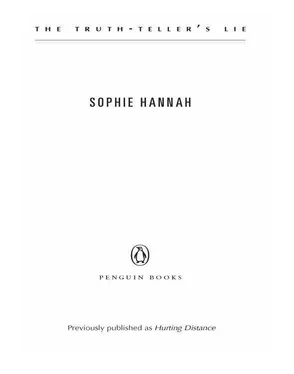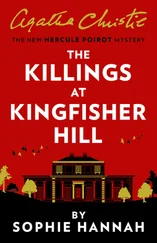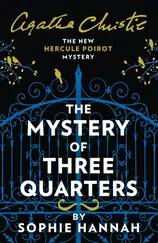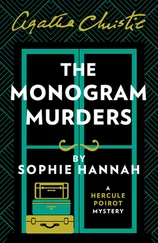‘Rawndesley East Services. At the Traveltel?’
I picture Waterhouse’s brain as a computer. Everything I tell him is a new piece of data to enter. ‘No. In the food-court bit. What I said about the Traveltel was a lie. I know there’s a Traveltel at Rawndesley East Services, and I wanted to keep my lie as close to the truth as possible.’
‘What about room eleven? The same room every time?’ He says this more quietly and sensitively than he’s said anything else. It’s a bad sign. He watches me carefully.
‘I made that up. I’ve never been inside the Traveltel or any of its rooms.’
Once he’s heard my story, he will be in no doubt that I’m telling the truth; he won’t bother to talk to staff at the Traveltel. And he knows I know this is something he could easily check. So why, he will think, would I tell such a risky lie?
‘So you met Mr Haworth, your rapist, for the second time on the twenty-fourth of March last year, in the food court of Rawndesley East Services?’
‘Yes. I saw him. He didn’t see me.’
Waterhouse leans back in his chair, throws his pen down on the desk. ‘It must have been a shock, seeing him like that.’
I say nothing.
‘How did you find out his name and where he lived?’
‘I followed him out to his van. It’s got his name and phone number on it. I got his address from the phone book.’ He can ask me anything. I will have my answer ready—a good, plausible answer—within seconds. Every time he draws my attention to a detail that he hopes will trip me up, I find a way to work it into my story. Everything can be reconciled. All I have to do is approach it methodically: this must be the case, and this must also be the case. What story will make that possible?
‘I can’t see it,’ says Waterhouse. ‘You know his name, you know where he lives. You said you were thinking about taking things into your own hands. Why didn’t you?’
‘Because if I’d ended up with a criminal record, that’d be another victory for him, wouldn’t it? I told you, I wanted the police to turn up at his house and give him the fright of his life. I didn’t want to have to . . . be face to face with him myself.’
‘So you cooked up a whole story about an affair, room eleven every Thursday night, your friend ringing up and speaking to Mr Haworth’s wife?’
‘Yes.’
He consults his notes. ‘Do you have a friend and lodger called Yvon?’
I hesitate. ‘Yes. Yvon Cotchin.’
‘So not everything you said yesterday was a lie. That’s at least one lie you’ve told today, then. What about the panic attack, going to his house? Meeting Mrs Haworth?’
‘That was all true,’ I tell him. ‘I did go there. That was what made me think I couldn’t handle it myself. So I came to you.’
Waterhouse says, ‘Yesterday you gave me and Sergeant Zailer a photograph of you with Mr Haworth. How do you explain that?’
I try not to let surprise and annoyance show on my face. I should have thought about this, and I haven’t. I completely forgot about the photo. Calmly, I say, ‘It was a fake.’
‘Really? How did you do it, exactly?’
‘I didn’t. I took a photograph of Robert Haworth, and a photograph of me, and a friend did the rest.’
‘Where did you get the one of Mr Haworth?’
I sigh, as if this should be obvious. ‘I took it myself, in the service-station car park. On the twenty-fourth of March last year.’
‘I don’t think so,’ says Waterhouse. ‘He didn’t see you, standing right in front of him? And how come you had a camera with you?’
‘I wasn’t standing right in front of him. I took the picture from a distance, on my digital camera. My friend enlarged it on a computer and zoomed in on his head and shoulders, to make it look like a close-up . . .’
‘What friend? Miss Cotchin again?’
‘No. I’m not going to give you his name. Sorry. And, to answer your other question, I always have a camera with me when I’m on my way to see a prospective client, as I was that day. I take photographs of their gardens, or their walls, wherever it is they want the sundial. It helps me to work if I’ve got a picture of the location to refer to.’
Waterhouse looks uncomfortable. I see a flicker of doubt in his eyes. ‘If the story you’re telling me now is true, then the way your mind works is very strange,’ he says. ‘If it isn’t, I can prove that you’re lying.’
‘Perhaps you ought to let me tell you what I came here to tell you. Once you’ve heard what happened to me, you’ll see how it might mess with anybody’s head. And if you still don’t believe me after I’ve told you what I went through, I’ll make sure never to say another word to you ever again, if you think I’d lie about something like that!’
I know it doesn’t help to endear me to him that I am furious instead of weepy, but I am so used to anger. I’m good at it.
Waterhouse says, ‘As soon as I take your statement, this becomes official. Do you understand?’
A small spasm of panic shakes my heart. How will I begin? Once upon a time . . . But I am not confessing or revealing. I am lying through my teeth—that’s the way to look at it. The truth will only be there to serve the lie, which means I don’t have to feel the feelings.
‘I understand,’ I say. ‘Let’s make it official.’
6
4/4/06
STATEMENT OF NAOMI JENKINS of 14 Argyll Square, Rawndesley. Occupation: self-employed, freelance sundial-maker. Age: 35 years.
This statement is true to the best of my knowledge and belief, and I make it knowing that, if it is tendered in evidence, I shall be liable to prosecution if I have wilfully stated anything in it which I know to be false or do not believe to be true.
Signature: Naomi Jenkins Date: April 4, 2006
On the morning of Monday, March 30, 2003, I left my house at 0940 and went to collect some Hopton Wood stone that I needed for my work from a local stonemason, James Flowton of Crossfield Farm House, Hamblesford. Mr Flowton told me that the stone had not yet arrived from the quarry, so I left immediately and walked back up the track to the main road, Thornton Road, where I’d parked my car.
A man I had never seen before was standing beside my car. He was tall, with short, dark-brown hair. He was wearing a light-brown corduroy jacket with what looked like a sheepskin lining, black jeans and Timberland boots. As I approached, he called out, ‘Naomi!’ and waved. His other hand was in his pocket. Even though I didn’t recognise him, I assumed he knew me and was waiting for me. (I now know the man to be Robert Haworth, of 3 Chapel Lane, Spilling, but I did not know this at the time.)
I walked right up to him. He grabbed my arm and produced a knife from his jacket pocket. I screamed. The knife had a hard, black handle about three inches long and a blade that was about five inches long. He pulled me towards him, so that we were standing chest to chest, and pushed the tip of the knife against my stomach. Throughout all this he kept smiling at me. In a quiet voice, he told me to stop screaming. He said, ‘Shut up or I’ll cut your guts out. I’ll cut your heart out. You know I mean it.’ I stopped screaming. Mr Haworth said, ‘Do exactly what you’re told and you won’t end up with a knife inside you, all right?’ I nodded. He seemed angry that I hadn’t answered him. ‘All right?’ he repeated.
This time I replied by saying, ‘All right.’
He put the knife back in his pocket, linked his arm through mine and told me to walk to his car, which was parked approximately two hundred metres further up Thornton Road in the direction of Spilling, outside a shop called Snowy Joe’s, which sells sports equipment. His car was black. I think it was a hatchback. I was too frightened to notice the make, model or registration.
Читать дальше












